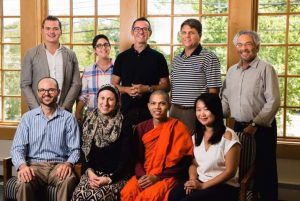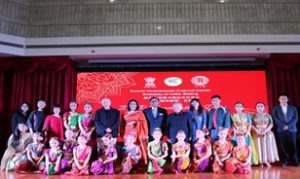May We Gather – organized by a six-person collective in Duncan Ryūken Williams, Funie Hsu, Chenxing Han, Patricia Wakida, Jhani Randhawa, and Juliet Bost Yokoe – is commemorating the racially-motivated shootings of Yong Ae Yue in Atlanta and Vicha Ratanapakdee in San Francisco with a pilgrimage, scheduled for 16 March 2024, and an online speaker series leading up to the pilgrimage funded by the Asian Pacific American Religions Research Initiative. The lecture series is titled “Resilience, Recovery, Repair” and will be co-hosted with Tricycle: The Buddhist Review.
The twin events seek to educate and heal the wounds inflicted by the racially and religiously motivated anti-Asian violence in 2020 and 2021, and the recent spate of vandalization of Buddhist temples across the United States. The in-person pilgrimage will be held at Antioch, California. In their press release, May We Gather stated:
In keeping with Buddhist ritual cycles of mourning and remembrance, we will commemorate the three-year memorial of the 2021 Atlanta-area spa shootings, which claimed the lives of eight people, six of them women of Asian descent. We will recover and celebrate Asian American Buddhist history in Antioch, in California, and across the United States, to strengthen the ties of kinship that connect each of us across time, place, race, religion, and gender. Our ceremony and pilgrimage will feature Buddhist chanting, Dharma reflections from six women Buddhist leaders across lineage and heritage, a communal peace walk, and a Daoist memorial ritual, followed by an informal community reception.
(May We Gather)
“Resilience, Recovery, Repair” started on 24 January, and there will be two more panels on the 8th and 22nd of February. It highlights topics central to the upcoming memorial pilgrimage in March, with scholars, spiritual teachers, educators, and community leaders and elders joining in discussions on “19th-century gender and immigrant experiences, folk religion and spiritual life, and contemporary projects of restoration and repair in California,” and more. (May We Gather)

Each session was titled with the intention of highlighting unique historical experiences that remain collectively resonant with the Asian American experience. On 24 January, for the session on “Resilience: A Story of 19th-Century Chinese Immigrants in Antioch and Beyond,” Antioch resident Lucile Meinhardt joined Dr. Williams to discuss the Chinese immigrant experience in the 19th century. Topics included “Antioch’s formation and evolution, the immigration of Chinese laborers and merchants, the positioning of Chinese women in the city and in California Chinatowns more broadly, and Antioch’s contemporary Chinese History Project.” (May We Gather)
On 8 February, Han will moderate “Recovery: The History of America’s Early Buddho-Daoist Temples” and discuss the process of cultural and religious recovery through architecture and archives with Dr. Chuimei Ho, Dr. Bennett Bronson, and Dr. Jonathan H.X. Lee. Finally, on the 22nd, “Repair: A Path to Healing Land and Ancestors” will see Dr. Hsu discuss broader issues of spiritual friendship and solidarity with Corrina Gould of Sogorea Te’ Land Trust, Christine Cordero of Asian Pacific Environmental Network, and Devin Berry and Noliwe Alexander of Deep Time Liberation. Asian American Buddhist resilience and recovery is seen as part of a broader unity of Indigenous-, Asian- and Black-led efforts against the racial karma of settler colonialism, western imperialism, and enslavement.
The press released further noted:
The May We Gather collective recognizes that marginalized communities across traditions have experienced physical oppression and the violence of having their sacred sites destroyed. We consider these experiences interlinked. The parallels we observe in the 1876 burning of Antioch’s Chinatown, the fatal shootings in Atlanta, and ongoing acts of aggression toward communities seen as “others” are a reminder that racial, religious, and gendered violence affects us all. Our 2024 programming—May We Gather: A National Buddhist Pilgrimage for Asian American Ancestors and Resilience, Recovery, Repair: An Online Speaker Series—is dedicated to healing these historic and present-day harms, and to recognizing the contributions of Asian American women.
(May We Gather)
May We Gather seeks to remind Americans and the world that the shootings must be accorded their proper context: “a broader tapestry of anti-Asian animus, religious bigotry, and injustice against women” in the US and, in different contexts, elsewhere in the Global North. “The suffering of racial, religious, and gender violence affects us all.” (May We Gather)
The pilgrimage will be livestreamed on 16 March at 13:00 PDT and can be tweeted at with the hashtag #MayWeGather2024.
See more
2024: 3 Year Pilgrimage Press Kit (May We Gather)
Related news from BDG
Percent of Asian American Adults Identifying as Buddhist in Decline According to New Study
North American Buddhists to Offer Memorial Ceremony for Asian American Ancestors on 4 May
Japanese Americans Commemorate Remembrance Day
Buddhist Artist Bernice Bing Receives Solo Show at the Asian Art Museum
Related features from BDG
Book Review: The Making of American Buddhism
Book Review: Chenxing Han’s Be the Refuge
For the Ancestors and for Peace: A Conversation with the Organizers of “May We Gather”















I think it’s very beneficial and necessary to stand against and make people aware of anti-Asian hate. However the incident that the organizers chose to commemorate doesn’t seem to be motivated by racist ideology. In case of the Atlanta shooting the shooter was targeting sex workers (which he himself often used apparently), and himself indicated he was not motivated by anti-Asian hate: https://en.wikipedia.org/wiki/2021_Atlanta_spa_shootings#Motive